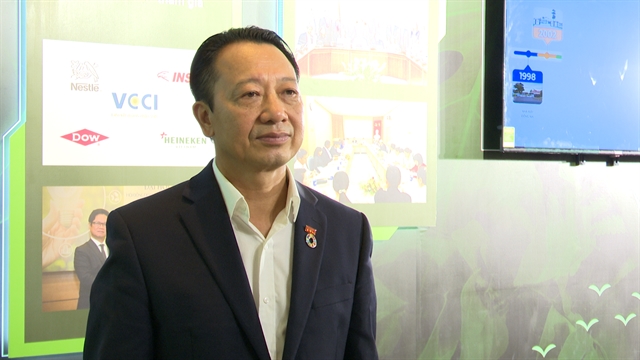 Economy
Economy

 |
| Nguyễn Quang Vinh |
Typhoon Yagi has caused widespread devastation, severely impacting both populace and businesses. Reflecting on the storm underscores the urgent need for sustainable development as a critical strategy for businesses to effectively respond to climate change.
Nguyễn Quang Vinh, vice chairman of the Việt Nam Chamber of Commerce and Industry (VCCI) and chairman of the Việt Nam Business Council for Sustainable Development (VBCSD), discusses the business community’s efforts towards green transformation and the goal of net-zero emissions by 2050 in Việt Nam.
How do you assess the current state of Vietnamese enterprises in their efforts towards green transformation and the net-zero target?
Many northern provinces and cities in Việt Nam recently endured the most severe tropical storm in 30 years, causing very heavy damage. With climate change continuing to intensify, extreme weather events like this are likely to become more frequent. As a result, achieving net-zero by 2050 has become an urgent priority for the business community.
Vietnamese enterprises today are far more aware of the importance of sustainable development and green transformation compared to 5 or 10 years ago. Leading companies, in particular, are at the forefront of investing in sustainable practices in alignment with the global shift towards net zero by 2050.
Among VBCSD-VCCI members, green growth and transformation messages are actively promoted not only within their organisations but also across their entire value chains.
Companies such as Vinamilk, Greenfeed, Traphaco, PAN Group, Nestlé Vietnam, Coca-Cola Vietnam, and Unilever Vietnam are adopting various clean, low-emission production models based on circular economy principles. These companies are also fostering sustainable livelihoods for disadvantaged communities through inclusive business practices.
However, many challenges remain for companies pursuing green transformation. According to a report titled "Readiness and Challenges of Enterprises in Green Transformation", made by the Private Economic Development Research Board (Board IV) and submitted to the Government in late July, a survey of 2,734 enterprises identified three primary obstacles: securing capital, accessing specialised personnel, and finding suitable technical solutions.
Additionally, some companies reported that pioneering efforts to build factories and standardise processes to meet international standards offer export advantages. The number of such companies, however, is limited due to a lack of information and the high costs associated with standardisation. These barriers must be addressed to open the path for the wider Vietnamese business community to engage in green transformation.
What efforts have agencies like VCCI made to support businesses in their green transformation and sustainable development?
VCCI has actively collaborated with various ministries and sectors to support businesses, not only by creating forums for dialogue, but also by sharing knowledge and experiences on sustainable development models. This helps businesses learn and identify the most suitable approaches for their needs.
VCCI has also developed and published a set of indicators to promote sustainable transformation among different partners. For example, the Provincial Green Index (PGI) encourages provinces and cities to focus on economic development alongside environmental protection. Similarly, the Corporate Sustainability Index (CSI) motivates businesses to adopt sustainable governance practices, enhancing their competitiveness while promoting responsible practices.
Through its focal point, VBCSD, VCCI is partnering with IDH Vietnam to implement the Sustainable Industrial Parks Initiative, which includes developing and promoting the Sustainable Industrial Park Index (SIP Index).
In your opinion, how can businesses take proactive steps and collaborate to achieve their sustainability goals?
Over the years, VCCI has partnered with central agencies and sectors to support businesses, facilitating dialogue and sharing knowledge on sustainable development models. This has helped companies identify the best approaches. The Việt Nam Corporate Sustainability Forum (VCSF) is a prime example of this collaboration.
VCCI has also developed various indices aimed at promoting sustainable transformation. The PGI encourages provinces and cities to prioritise both economic development and environmental protection, while the CSI motivates the business community to embrace sustainable corporate governance, thereby enhancing competitiveness and fostering responsible business practices.
Currently, through the VBCSD initiative, VCCI is working with IDH Vietnam to implement the Sustainable Industrial Parks Initiative. The SIP Index, once finalised, will assist industrial parks and local authorities in regularly assessing, monitoring, and implementing strategies to enhance the economic, environmental, social, and governance sustainability of industrial parks and their tenants.
The success of any initiative, however, depends on the active participation of businesses committed to sustainable development. Companies can positively influence consumer trends, foster sustainable livelihoods for communities, and conserve biodiversity through "nature-positive" business models. They can also support other businesses within their value chains.
In the pursuit of net-zero, businesses should focus not only on research, but also on actively implementing practices that reduce emissions and protect the environment. Prioritising sustainable governance, strengthening stakeholder commitments, and investing in human capital will be essential for driving green transformation within both businesses and the broader community.
Khuất Quang Hưng, director of External Affairs and Sustainable Development at Nestlé Vietnam:
 |
| Khuất Quang Hưng |
We, at Nestlé Vietnam, believe that our employees are our greatest asset in driving green transformation. We engage them through various initiatives, including awareness campaigns, training programmes, and employee-led sustainability projects. By encouraging employees to share ideas and propose sustainable practices, we foster a culture of innovation and collaboration. This ensures that sustainability becomes a shared responsibility ingrained in our organisational DNA.
Our Green Ambassador programme is a key initiative, promoting green lifestyles and communicating the sustainability message throughout our value chain. It empowers employees to champion sustainability, both within the company and among partners and the community.
Despite challenges, we at Nestlé Vietnam believe that green transformation, when pursued correctly, can drive value creation. By aligning sustainability initiatives with consumer needs and fostering a dedicated workforce, Nestlé is committed to making a positive environmental impact while generating long-term value for the business. VNS




